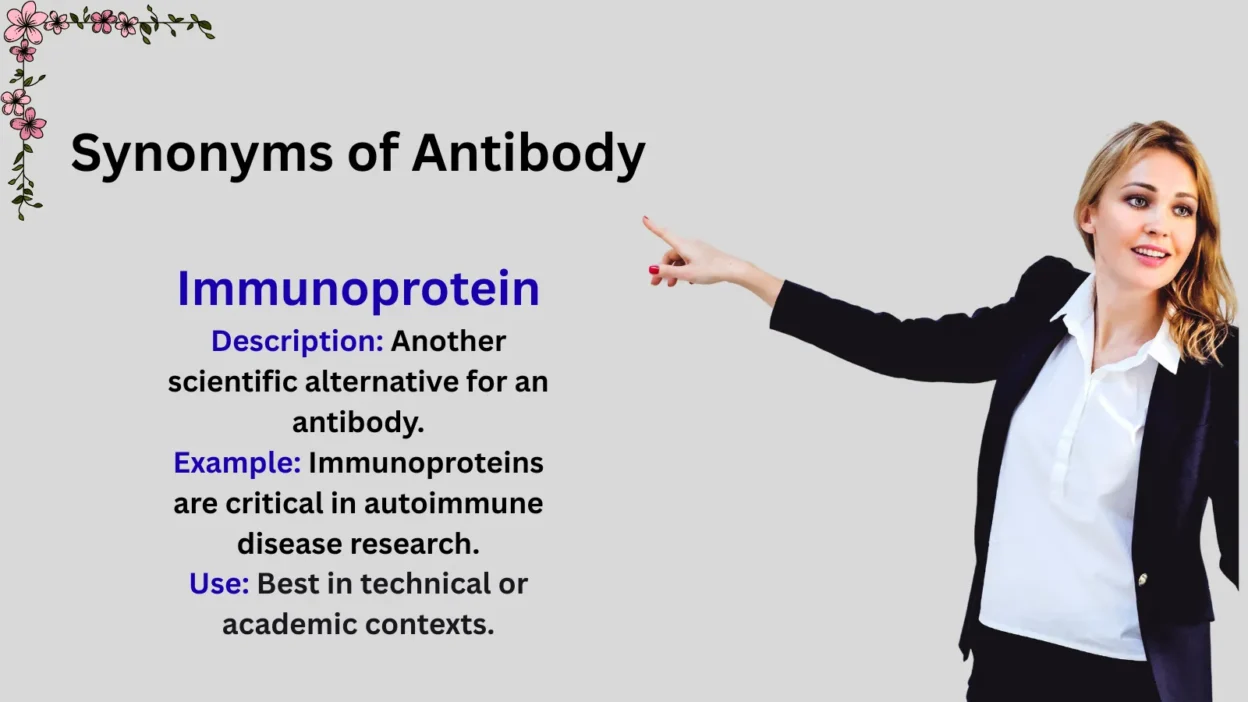Synonyms of antibody, such as immunoglobulin, immune protein, and serum protein, reflect the scientific and biological sides of the body’s defense system. For example, “immunoglobulin” is the formal medical term used in research and healthcare, while “immune protein” offers a simpler way to describe the same protective function.
If you’re writing about biology, medicine, or health education, choosing the right synonym helps you match your tone—whether you need scientific precision or easy understanding.
In this guide, we’ll explore several ways to refer to antibodies and when each is most appropriate. From textbooks to casual explanations, the language of antibodies connects science, health, and protection.
What Does Antibody Mean?
An antibody is a special protein made by the immune system to find and neutralize harmful invaders such as bacteria and viruses. It’s often:
- A key part of immune defense
- Specific to one type of germ or toxin
- Used in medicine and research to detect disease
- Essential for vaccines and immunity
It’s not just a scientific term—it’s a symbol of the body’s strength and memory in protecting itself from illness.
Synonyms & Related Words for Antibody (And When to Use Them)
1. Immunoglobulin
Meaning: A scientific term for antibodies; they are glycoproteins produced by plasma cells.
Example: “The patient’s immunoglobulin levels were tested to assess immunity.”
Usage Tip: Use this in formal, medical, or research contexts.
2. Immune Protein
Meaning: A general term for proteins that contribute to immunity.
Example: “Immune proteins play a crucial role in fighting infections.”
Usage Tip: Great for educational writing or simplified explanations of the immune system.
3. Defensive Protein
Meaning: Focuses on the protective role of antibodies.
Example: “Defensive proteins prevent harmful microbes from multiplying.”
Usage Tip: Useful in accessible science writing aimed at a general audience.
4. Protective Antibody
Meaning: Emphasizes the antibody’s protective function.
Example: “The vaccine triggers the production of protective antibodies.”
Usage Tip: Ideal when discussing vaccines or immunity benefits.
5. Immunoprotein
Meaning: Another scientific alternative for an antibody.
Example: “Immunoproteins are critical in autoimmune disease research.”
Usage Tip: Best in technical or academic contexts.
6. Neutralizing Antibody
Meaning: Antibodies that specifically neutralize pathogens or toxins.
Example: “The patient developed neutralizing antibodies against the virus.”
Usage Tip: Often used in research or discussions of vaccines and treatments.
7. Serological Protein
Meaning: Refers to antibodies detected in blood serum.
Example: “Serological proteins indicate past exposure to the disease.”
Usage Tip: Useful in lab reports or medical diagnostics.
8. Immune Factor
Meaning: A broader term for any component of the immune system, including antibodies.
Example: “Various immune factors contribute to overall health.”
Usage Tip: Use when describing immunity in general terms.
9. Plasma Protein
Meaning: Antibodies are a type of plasma protein found in the blood.
Example: “Plasma proteins help the body respond to infection.”
Usage Tip: Appropriate in biology or medical discussions.
10. Lymphocyte Product
Meaning: Highlights that antibodies are produced by lymphocytes (B cells).
Example: “Lymphocyte products are essential for adaptive immunity.”
Usage Tip: Best for scientific explanations of immune mechanisms.
11. Defensive Molecule
Meaning: Focuses on the molecular nature and protective function.
Example: “Defensive molecules like antibodies stop viral replication.”
Usage Tip: Can be used in science communication or educational writing.
12. Immunity Protein
Meaning: Stresses the antibody’s role in immune defense.
Example: “Immunity proteins are vital in resisting infections.”
Usage Tip: Good for general science writing.
13. Autoantibody
Meaning: Antibodies that mistakenly target the body’s own tissues.
Example: “Autoantibodies can trigger autoimmune disorders like lupus.”
Usage Tip: Appropriate in clinical discussions of disease.
14. Monoclonal Antibody
Meaning: Lab-produced antibodies targeting a specific antigen.
Example: “Monoclonal antibodies are used in cancer therapy.”
Usage Tip: Common in medical and biotech contexts.
15. Polyclonal Antibody
Meaning: A mixture of antibodies targeting multiple sites on an antigen.
Example: “Polyclonal antibodies are often used in diagnostic tests.”
Usage Tip: Technical term for lab research and diagnostics.
16. Protective Protein
Meaning: Similar to “defensive protein,” highlighting immune protection.
Example: “Protective proteins defend the body against pathogens.”
Usage Tip: Works well in educational or non-technical contexts.
17. Immune Response Agent
Meaning: Highlights the antibody as a participant in the immune response.
Example: “Immune response agents are activated after vaccination.”
Usage Tip: Ideal for scientific explanations of immunology.
18. Antigen-Fighting Protein
Meaning: Describes antibodies by their action against antigens.
Example: “Antigen-fighting proteins identify and neutralize viruses.”
Usage Tip: Perfect for introductory science texts or popular science.
19. B-Cell Product
Meaning: Emphasizes that antibodies are produced by B lymphocytes.
Example: “B-cell products are crucial in adaptive immunity.”
Usage Tip: Best in immunology lectures or lab contexts.
20. Humoral Mediator
Meaning: Indicates that antibodies act in the body’s humoral (fluid-based) immunity.
Example: “Humoral mediators are essential for long-term protection.”
Usage Tip: Use in technical or research-focused writing.
21. Therapeutic Antibody
Meaning: Antibodies designed for treatment purposes.
Example: “Therapeutic antibodies are used to combat chronic diseases.”
Usage Tip: Appropriate in medical, pharmaceutical, or biotech contexts.
22. Immune Defender
Meaning: Emphasizes protection and defense simply.
Example: “Immune defenders like antibodies guard against infection.”
Usage Tip: Good for accessible science content.
23. Antigen Receptor
Meaning: Refers to the part of the antibody that recognizes antigens.
Example: “Antigen receptors on antibodies determine their specificity.”
Usage Tip: Technical usage in immunology textbooks.
24. Pathogen Fighter
Meaning: A descriptive, general term for antibodies’ role in combating pathogens.
Example: “Pathogen fighters neutralize harmful bacteria in the bloodstream.”
Usage Tip: Friendly, approachable language for public health writing.
25. Immune Molecule
Meaning: General term for molecules involved in immunity.
Example: “Immune molecules include antibodies and other defensive proteins.”
Usage Tip: Useful when simplifying complex concepts.
26. Neutralizer
Meaning: Highlights the action of antibodies in neutralizing threats.
Example: “Neutralizers like antibodies prevent toxins from causing harm.”
Usage Tip: Works in simplified science content.
27. Resistance Protein
Meaning: Focuses on antibodies’ role in providing resistance against infection.
Example: “Resistance proteins help the body fight off pathogens.”
Usage Tip: Suitable for general science writing.
28. Adaptive Protein
Meaning: Highlights that antibodies are part of the adaptive immune system.
Example: “Adaptive proteins respond specifically to previously encountered antigens.”
Usage Tip: Academic or educational contexts.
29. Seroprotein
Meaning: Proteins in serum that include antibodies.
Example: “Seroproteins are measured to assess immunity.”
Usage Tip: Medical, lab, or research discussions.
30. Immunologic Agent
Meaning: Broad scientific term for any agent involved in immune function.
Example: “Immunologic agents include antibodies, cytokines, and other mediators.”
Usage Tip: Use in research papers or advanced immunology contexts.
How to Choose the Right Synonym
Choosing the right synonym depends on context, audience, and tone:
- Scientific or medical writing: Use precise terms like immunoglobulin, monoclonal antibody, autoantibody, or humoral mediator.
- Educational content for general audiences: Use descriptive terms like immune defender, pathogen fighter, or antigen-fighting protein.
- Lab research and diagnostics: Terms like seroprotein, polyclonal antibody, and B-cell product are preferred.
- Therapeutic or clinical context: Use a therapeutic antibody or a neutralizing antibody.
Emotional or cultural tone: Some synonyms make the text more approachable and engaging (e.g., immune defender), while others are technical and formal (e.g., immunoglobulin). Selecting the right term helps balance clarity and professionalism.
Conclusion
The study of antibody synonyms emphasizes the rich diversity of terms used in immunology and biology to describe these essential components of the immune system.
By exploring these terms, you gain a clearer perspective on the intricate ways the body defends itself, while also improving your ability to communicate scientific concepts accurately and effectively.
Understanding antibody synonyms reinforces the connection between language and science, showing how terminology can illuminate the vital processes that keep us healthy and help professionals.



